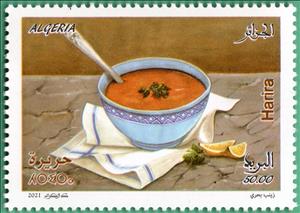Stamp: Harira (Algeria 2021)
Harira (Algeria 2021)
18 May (Algeria ) within release Traditional dishes goes into circulation Stamp Harira face value 50 Algerian dinar
| Stamp Harira in catalogues | |
|---|---|
| Yvert et Tellier: | Yt: DZ 1874 |
Stamp is horizontal format.
Also in the issue Traditional dishes:
|
Data entry completed
83%
|
|
|---|---|
| Stamp Harira in digits | |
| Country: | Algeria |
| Date: | 2021-05-18 |
| Print: | Offset lithography |
| Size: | 36 x 26 |
| Emission: | Definitive |
| Format: | Stamp |
| Face Value: | 50 Algerian dinar |
Stamp Harira it reflects the thematic directions:
Food is any substance consumed by an organism for nutritional support. Food is usually of plant, animal, or fungal origin and contains essential nutrients such as carbohydrates, fats, proteins, vitamins, or minerals. The substance is ingested by an organism and assimilated by the organism's cells to provide energy, maintain life, or stimulate growth. Different species of animals have different feeding behaviours that satisfy the needs of their metabolisms and have evolved to fill a specific ecological niche within specific geographical contexts.
Gastronomy is the study of the relationship between food and culture, the art of preparing and serving rich or delicate and appetizing food, the cooking styles of particular regions, and the science of good eating. One who is well versed in gastronomy is called a gastronome, while a gastronomist is one who unites theory and practice in the study of gastronomy. Practical gastronomy is associated with the practice and study of the preparation, production, and service of the various foods and beverages, from countries around the world. Theoretical gastronomy supports practical gastronomy. It is related with a system and process approach, focused on recipes, techniques and cookery books. Food gastronomy is connected with food and beverages and their genesis. Technical gastronomy underpins practical gastronomy, introducing a rigorous approach to evaluation of gastronomic topics
A tradition is a system of beliefs or behaviors (folk custom) passed down within a group of people or society with symbolic meaning or special significance with origins in the past. A component of cultural expressions and folklore, common examples include holidays or impractical but socially meaningful clothes (like lawyers' wigs or military officers' spurs), but the idea has also been applied to social norms and behaviors such as greetings, etc. Traditions can persist and evolve for thousands of years— the word tradition itself derives from the Latin word tradere literally meaning to transmit, to hand over, to give for safekeeping. While it is reportedly assumed that traditions have an ancient history, many traditions have been invented on purpose, whether it be political or cultural, over short periods of time. Various academic disciplines also use the word in a variety of ways.



